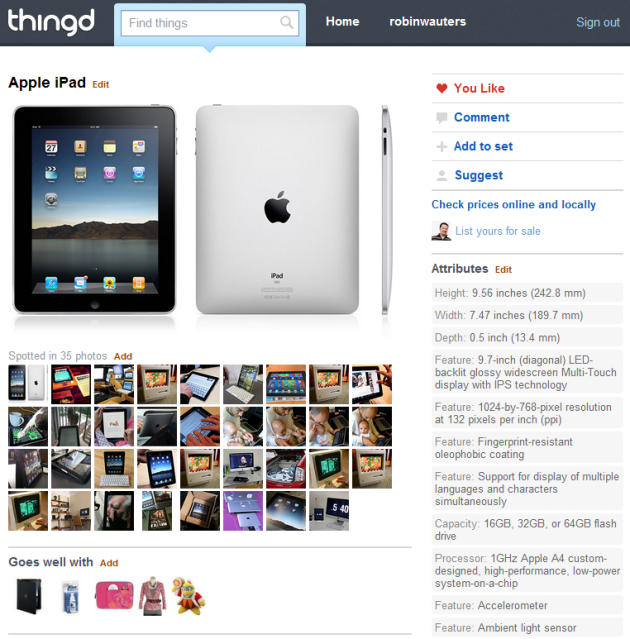Latest Gear Live Videos
Gmail favicon now shows unread message count

Posted by Patrick Lambert Categories: Google, Internet,
![]()
Ever since the advent of tabs, web sites with messaging or updating features have started providing unread message counts in the title, usually at the front, so that people can easily scan their opened tabs and see if any of them has unread stuff. Of course as tabs become more commonplace, heavy users have so many opened that often no part of the title is even visible anymore. Google introduced an innovative little feature today to fix that in Gmail. They call it the Unread Message Icon. It's a dynamic favicon that the server provides which updates the tab to show the number of unread messages in your inbox. Now, even in a crowded browser, you can easily see if you have new email. It's a simple improvement, but brilliant nonetheless, and I wouldn't be surprised to see other sites adopt the technique. To enable it, you have to go in your settings and click on the Labs options.
Read More  | Gmail Blog
| Gmail Blog
Advertisement
A Justin Bieber URL shortener

Posted by Patrick Lambert Categories: Internet,

URL shortners are a dime a dozen. From TinyURL, to Bit.ly, Goo.gl--heck, we even have our own gear.lv shortener! For a new one to succeed, they need to add something compelling. You know, like add new features and stuff? The latest site to arrive in the crowded space took a decidedly different path. With bieber.ly, you can look at giant images of Justin Bieber while browsing the web! It's still unknown if this was endorsed by the teenage superstar, but we would highly doubt that. Ridiculous? Sure! We're just throwing some credit out there for being unique. Trust us, we don't have, like, a total crush on Biebs or anything. Please believe us.
Read More  | Bieber.ly
| Bieber.ly
FCC approves net neutrality rules, not good enough

Posted by Patrick Lambert Categories: Corporate News, Internet,

Yesterday, a major decision passed through the FCC as it voted on new rules that will govern the sticky issue of net neutrality in the US. Net neutrality has been a wildly debated subject for years, with everyone from content web sites, Internet providers, wired and wireless networks, and organizations representing end users being all over the map on this subject. Some wanted the government to pass new regulations that would prevent Internet providers from say, slowing down your access to Netflix just because they have their own video site that they want you to use instead. Others argued that if the government does get involved, it could bring much more trouble for the Internet as a whole than the benefit it would add. Others still argued that the free market will handle itself, and that no rules should be added.
So far there had been no real decision either way, with the FCC, the body mandated to govern those things, not having made any clear decision. This changed today as the institution passed a set of rules that help define this. The rules are quite complicated, but suffice it to say pretty much everyone who isn't a big business is unhappy with them. On one side, the new rules do prevent Internet providers from blocking or slowing down access to competing web sites, but it does allow content providers to pay networks to have access to a fast line, bringing their data in priority. Many say the rules are too broad and vague, and fail to address some points. It also leaves a lot of freedoms to wireless providers to, for example, block access to specific apps on your cellphone.
While the debate rages on however, it's important to recognize that these rules simply give formal authority to the federal government to regulate these issues, it doesn't directly change the rules of the game for companies. The new rules will go into effect next year, and could still be blocked by Congress. They are also likely to be challenged in court by any of the parties involved in the discussions.
You can help show your support in the fight for net neutrality at Save the Internet.
Read More  | WSJ
| WSJ
Google Chrome now has over 8,500 extensions

Posted by Patrick Lambert Categories: Google, Internet, Software,

Last week, Google put up a blog post with some statistics on their Chrome browser. Of note, the browser now has over 8,500 extensions and 1,500 themes, which have been installed over 70 million times. They also describe some of the latest updates the browser has had such as the sync feature, better HTML5 support and new APIs for developers. Google also promises that they will not be slowing down the amount of new features. On the roadmap they say new APIs will be added for things like the omnibox and pinned tabs, as well as download management and network interception. With the release of the Chrome Web Store this week, Google is clearly positioning themselves as one of the top players in the browser market.
Read More  | Google Chrome Blog
| Google Chrome Blog
Chrome Web Store now open

Posted by Patrick Lambert Categories: Google, Internet, Software,
Today Google had a presentation event all about Chrome and Chrome OS. After going through a history lesson of their web browser where they talked about how their update model and sandboxing gives them great security, all the new features they've introduced lately (like Google Instant,) as well as their speed improvements, they went to the meat of the day, and showed off the Chrome Web Store. This is essentially their app store for the web. Bringing executives from well known companies like Electronics Art, the New York Times, and Amazon, they went over several web apps that are now available, or will be available soon. Overall, these are all purely web apps, including several using Adobe Flash, so nothing that couldn't have been done on simple web sites in the first place. The selection will include everything from news apps, games, and everything that one could expect to find in another app store. Many of the apps will also include some offline features, such as being able to read a magazine online or offline, since it caches the information on your system, very similar to what Google Gears offered. Google is now rolling their new store out, starting today in the US, and spreading worldwide in the coming months.
Read More  | Chrome Web Store
| Chrome Web Store
South Park Sued for Copying YouTube Video

Posted by K.C. Morgan Categories: Animation, Comedy, Prime Time, Cable, Video,
Many South Park fans remember the 2008 “Canada on Strike” episode, which celebrated/parodied some of the Internet’s biggest YouTube sensations. The “Chocolate Rain” guy, dramatic gopher and "Star Wars kid" were all portrayed in the episode … but none of them are the one who’s suing the show.
South Park, cable network Comedy Central and parent company Viacom are being collectively sued for copyright infringement of the YouTube hit “What What (in the Butt).” The video, which has scored over 33 million views, was re-made on Park, with Butters playing the role of YouTube singer Samwell. The video above shows a comparison of the two videos, highlighting the similarities.
Click to continue reading South Park Sued for Copying YouTube Video
Read More  | CNN
| CNN
GoDaddy changes default domain from .com to .co for a day

Posted by Patrick Lambert Categories: Corporate News, Internet,

Yesterday one of the biggest domain registrars, GoDaddy, switched their default domain registration service to .co instead of .com. This means that when anyone searched for a new domain to register, the first response they would get is a .co domain instead of the usual one. While the company calls it a test, it's easy to guess that they are planning to shift away from the crowded .com domain space. Let's face it, anyone who wants a domain name now is likely to find their first choice will be already taken as a .com, which isn't surprising with almost 100 million registered names.
Click to continue reading GoDaddy changes default domain from .com to .co for a day
Read More  | CO Internet
| CO Internet
New laws planned for Internet Privacy

Posted by Patrick Lambert Categories: Internet,
The Wall Street Journal published a report last week saying that the Obama administration could make a move that is being called a turning point in privacy oversight. The White House is pushing for new privacy laws and a new position to oversee the matter, an Online Privacy Watchdog. The US Dept of Commerce is currently said to be drafting a series of recommendations that, if made into laws, would add a significant layer of protection for consumers's privacy when dealing with online services, everything from buying items online and giving out your credit card information, to how sites like Facebook or Google handle your personal data. While nothing is final yet, this would bring the US in line with other countries like Germany and the UK who already are tackling the online privacy issue.
Read More  | Wall Street Journal
| Wall Street Journal
JackThreads redesigns, get your invite and $5 now!

Posted by Andru Edwards Categories: Wearables, Hot Deals, Internet,
Our friends over at JackThreads have just given their website a makeover, and we've also noticed that they've started selling more technology and gadgets recently as crazy discounted prices. They also still sell clothing and accessories too, and everything is at a discount that is sometimes up to 90% off. You've gotta be a member to get in on the action, and to join, you need to be invited. Lucky for you, we've got an invite link that you can take advantage of to join JackThreads, and it'll even hook you up with $5 in credit that you can use on anything you'd like.
Ambitious startup Thingd aims to catalog everything

Posted by Jazz English Categories: Startups,

Thingd was recently put in the spotlight by the New York Observer, ending a period of intentional un-discovery.
Click to continue reading Ambitious startup Thingd aims to catalog everything
Advertisement
© Gear Live Inc. {year} – User-posted content, unless source is quoted, is licensed under a Creative Commons Public Domain License. Gear Live graphics, logos, designs, page headers, button icons, videos, articles, blogs, forums, scripts and other service names are the trademarks of Gear Live Inc.











